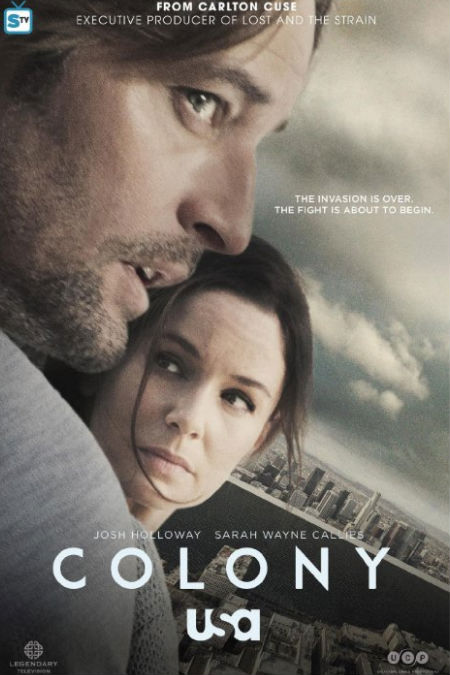
Colony is one of those enormously-promising shows that seems to spring fully-formed into the pop culture consciousness.
Drawn from the prolific hand of Carlton Cuse (Lost, Bates Motel, The Strain) and co-creator Ryan Condal, Colony presents us with a not-too distant Los Angeles, ringed by a giant wall and under the iron boot of a police state.
Food is scarce with items like bacon and coffee considered a luxury, cars near non-existent unless you are a member of the dictatorial ruling elite – bikes are everywhere, turning a city once synonymous with motor vehicles into Amsterdam-in-California – and civil liberties severely curtailed, if not eradicated altogether.
The thing is, the near omnipresent oppressive police forces, who swoop in without warning or due process to take people who have transgressed a seemingly unending raft of edicts, to a place ominously called “The Factory”, are the public face of an altogether alien occupying force who arrived in something euphemistically referred to as “The Arrival”.
Depending on who you are talking to, the arrival of these never-seen but often-referred to extraterrestrials, who took out all of Los Angeles’s defenses in just eight hours, purging military and police personnel with extreme prejudice in the process, is either the harbinger of a glorious future for humanity or the beginning of the end.
Occupying the middle ground is near impossible as Will and Katie Bowman (Josh Holloway and Sarah Wayne Callies) have discovered – you are either with the occupation and hence a collaborator (some do this out of greed and opportunity; others out of a sense of weary practicality) or you are the Enemy.
Will and Kate have done their best to fade into the woodwork with Will’s identity as a former army ranger and FBI agent marking him as an enemy of the state and someone to be terminated if his past ever becomes known.
But a trip into the neighbouring Santa Monica zone – it seems the Earth has been divided into small, easily-controllable fiefdoms each headed by a compliant governor, happy to toady to his or her alien overlords – in search of his middle child Charlie, who got separated from his family in the attack, sees Will exposed as far more than just a neighbourhood mechanic.
Forced into collaboration with the proxy human regime, Will finds himself torn between his new role as a police investigator for Homeland Security, which has now well and truly grown into its ominous sounding name, and his desire to uphold the old values, freedoms and values that were the cornerstone of his former career.
Kate on the other hand is taking a far more active role in resisting alien rule, working with the Resistance in concert with old family friend Eric Broussard (Tory Kittles) and now thanks to Will’s unexpected ascension, a mole among the enemy.
While Will would no doubt be sympathetic to Kate’s actions, he’s unaware of her secret activities, his only concern being safeguarding the safety of his family, an altogether more pressing priority now his son is missing.
Thus is borne a dilemma of epically dramatic proportions as Will must dance between his role as an unwilling collaborator – he only agrees to take on the role after the local governor, Alan Snyder (Peter Jaconson) who lives in luxury with the rest of the toadying elite in the Green Zone up in LA’s canyons, dangles the possibility of Charlie being returned to him; that and his family not dying – and a man who must intrinsically do the right thing.
It’s not simply training, it’s innate to his being, marking Will as a good man in an impossibly bad situation.
Where Colony excels, apart from establishing a sense of time and place in elegantly-quick, exposition-light fashion – we are shown glancing shots of barbed wire on fences and drones moving about in the distance – is its establishment of the almost-impossible-to-navigate moral conundrum that confronts will and Kate, and indeed all of humanity.
Most people simply want to stay out of the fray, either keeping as low a profile as humanly possible or collaborating simply because it makes practical sense to do so – the alternatives are too awful to contemplate – or actively going out of their way to join the “winning side” (the Resistance would beg to differ on that point).
This is a real David Vs. Goliath story.
There’s no miracle solution waiting in the wings, no virus or Jeff Goldblum to deliver it into a waiting alien mother ship, and a real wearying sense that humanity has no real choice but to hope that the aliens stick to their commitment to depart after their mysterious “needs” are met. (These “needs” are never articulated, at least in the first two episodes, and Snyder’s dropping of the word sounds innocuous and portent-laden all at once.)
So humanity is really up against it, facing a near-insurmountable enemy who clearly believes in the invincibility of its own might, power and cause.
If we do manage to take Earth back, it is going to be at great personal cost, which we see borne out up close in both Will and Kate, their family and friends such as Will’s onetime coworker Carlos (Jacob Vargas).
But even if that does happen, and the Resistance, led by Alexander Quayle (Paul Guilfoyle), the question will be what to do with the dark stain on the entirety of humanity’s soul. This is not like past invasion scenarios,such as Germany’s invasion of Europe in World War Two where you could mark collaborators as some bad apples among a largely good human populace worldwide; this is all of humanity in the firing line, an entire planet being called upon to choose sides and deal with the consequences.
Colony is an exquisitely well-placed, nuanced, beautifully-realised exploration of the darkness that lurks with the human psyche, an acknowledgement that aliens or not, we are, more often than not, our own worst enemies.